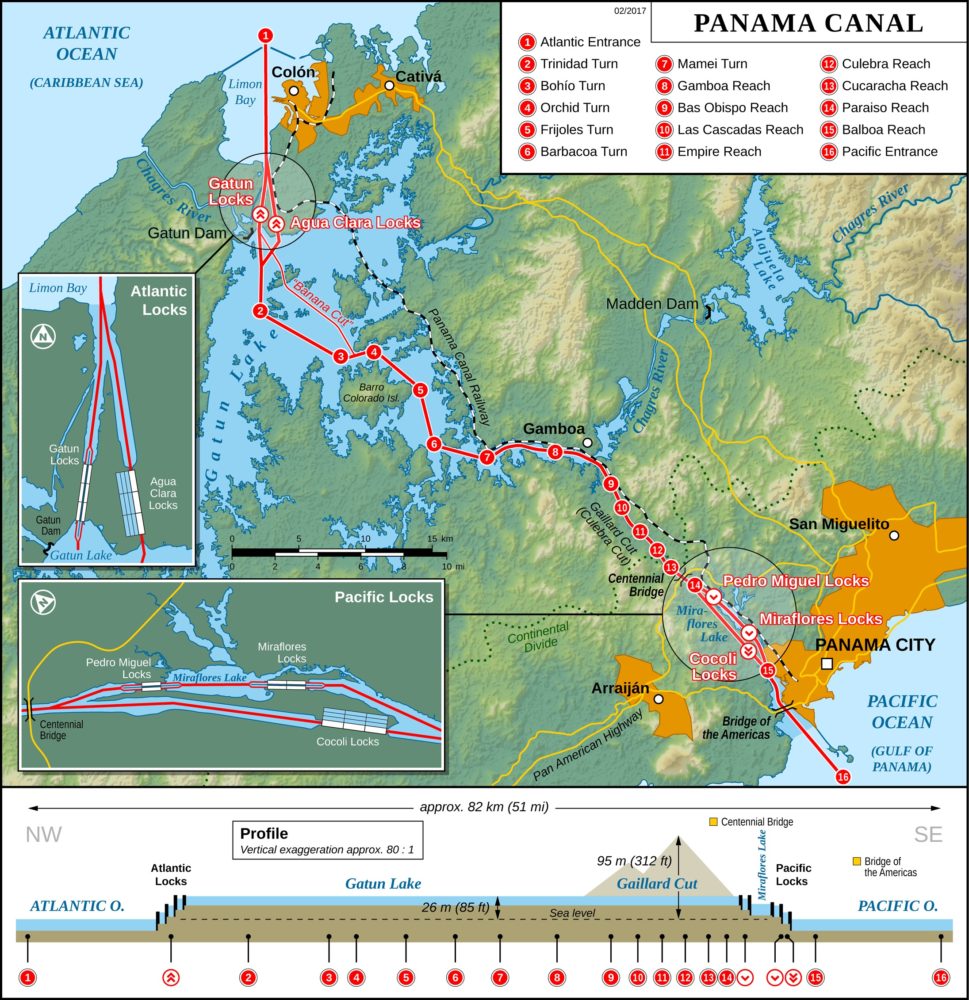Today’s installment concludes USA Acquires Rights to Build the Panama Canal,
the name of our combined selection from A. Maurice Low and Chauncey M. Depew. The concluding installment, by Chauncey M. Depew from Speech to the US Senate, was delivered on January 14, 1904.
If you have journeyed through all of the installments of this series, just one more to go and you will have completed seven thousand words from great works of history. Congratulations! For works benefiting from the latest research see the “More information” section at the bottom of these pages.
Previously in USA Acquires Rights to Build the Panama Canal.
Time: 1903

CC BY-SA 2.0 image from Wikipedia.
The farcical character of the action of the Colombian Congress and its complete control by Marroquin, together with the fact that Colombia could not subdue the revolution in Panama without the aid of the United States, are demonstrated by the following dispatch, sent November 6th, two days after the revolution in Panama, by our Minister Beaupré:
Knowing that the revolution has already begun in Panama, — says that if the Government of the United States will land troops to pre serve Colombian sovereignty and the transit, if requested by the Colombian chargé d’ affaires, this Government will declare martial law, and by virtue of vested constitutional authority, when public order is disturbed, will approve by decree the ratification of the canal treaty as signed; or, if the Government of the United States prefers, will call extra session of Congress and new and friendly members next May to approve the treaty.”
Because it was a telegram the name was indicated by a blank. The blank undoubtedly meant Marroquin, for no one else could have made such pledges. He says, in effect, to the United States:
A revolution has broken out in Panama, my army has gone over to the Republic and I am helpless. If you will put down that revolution, I will abandon the claim of ten million dollars more than was agreed to in the treaty which our Congress made. I will dismiss all presence that this Congress had any power or was other than myself. I will do everything you want. I will suspend the constitution. Then I can do anything and will ratify this treaty — the Hay-Herran Treaty — or do any other old thing you may desire; or, if you have constitutional lawyers in the Senate who doubt my ability or power to act under a suspension of the constitution, I will put the constitution again in force and summon the members of Congress here. Each of them will do what I tell him, and Congress will ratify the treaty in any form you suggest.”
Our diplomatic history bristles with recognitions of de-facto governments formed by revolutions. Where the sympathies of our people were with the revolt, Presidents have paid little attention to the possibilities of success or the offensive or defensive means of the revolting provinces or States. The principle of international law that recognition is wholly in the discretion of the Power that makes it and is not a cause for war, is too elementary to discuss.
Our obligation for forty-eight years to Colombia, to Panama, to our citizens and the world has been to keep communication and transit open and unmolested between the oceans. It is a territorial burden and runs with the land. It binds the United States to keep off the premises all hostile trespassers, whether they are the armies of the great Powers of Europe, of Colombia, or of the contiguous people of Panama.
We have had no other hand nor part in this revolution than the example of the American colonies and the successful application of the principles of liberty in the United States, which have created republics and undermined thrones all over the world. The advantages of the treaty with Panama over that with Colombia to the United States are incalculable. Instead of six miles for the canal zone, there are ten on each side of the waterway. Instead of a limited sovereignty, which would necessarily lead to endless complications, this territory is ceded outright and in perpetuity to the United States. At the termini of the canal it is vital that there should be unquestioned jurisdiction of the United States. In this territory the Government has complete authority for three marine leagues from Panama into the Pacific Ocean and three leagues from Colon into the Caribbean Sea. The Re public of Panama surrenders the right to impose port dues or duties of any kind upon ships and goods in transit across the isthmus. The sole power to impose tolls and collect them rests with the United States.
| <—Previous | Master List |
This ends our selections on USA Acquires Rights to Build the Panama Canal by two of the most important authorities of this topic:
- Article in Great Events by Famous Historians, Volume 20 by A. Maurice Low published in 1914.
- Speech to the US Senate by Chauncey M. Depew delivered on January 14, 1904.
A. Maurice Low began here. Chauncey M. Depew began here.
This site features short and lengthy pieces on all aspects of our shared past. Here are selections from the great historians who may be forgotten (and whose work have fallen into public domain) as well as links to the most up-to-date developments in the field of history and of course, original material from yours truly, Jack Le Moine. – A little bit of everything historical is here.
More information on USA Acquires Rights to Build the Panama Canal here and here and below.
 |
We want to take this site to the next level but we need money to do that. Please contribute directly by signing up at https://www.patreon.com/history
Leave a Reply
You must be logged in to post a comment.